
Senior writer Tina Hesman Saey is a geneticist-turned-science writer who covers all things microscopic and a few too big to be viewed under a microscope. She is an honors graduate of the University of Nebraska-Lincoln where she did research on tobacco plants and ethanol-producing bacteria. She spent a year as a Fulbright scholar at the Georg-August University in Göttingen, Germany, studying microbiology and traveling. Her work on how yeast turn on and off one gene earned her a Ph.D. in molecular genetics at Washington University in St. Louis. Tina then rounded out her degree collection with a master’s in science journalism from Boston University. She interned at the Dallas Morning News and Science News before returning to St. Louis to cover biotechnology, genetics and medical science for the St. Louis Post-Dispatch. After a seven year stint as a newspaper reporter, she returned to Science News. Her work has been honored by the National Academies of Sciences, Engineering and Medicine, the Endocrine Society, the Genetics Society of America and by journalism organizations.

Trustworthy journalism comes at a price.
Scientists and journalists share a core belief in questioning, observing and verifying to reach the truth. Science News reports on crucial research and discovery across science disciplines. We need your financial support to make it happen – every contribution makes a difference.
All Stories by Tina Hesman Saey
-
 Humans
HumansOnly a tiny fraction of our DNA is uniquely human
Some of the exclusively human tweaks to DNA may have played a role in brain evolution.
-
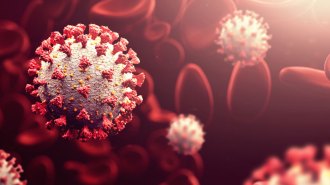 Health & Medicine
Health & MedicineHow your DNA may affect whether you get COVID-19 or become gravely ill
A study of 45,000 people links 13 genetic variants to higher COVID-19 risks, including a link between blood type and infection and a newfound tie between FOXP4 and severe disease.
-
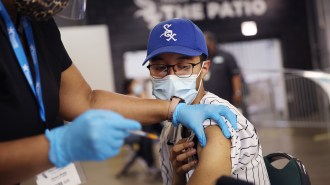 Health & Medicine
Health & MedicineThe benefits of COVID-19 mRNA vaccines outweigh the risk of rare heart inflammation
A CDC group says the benefits of the Pfizer and Moderna shots outweigh the risk of myocarditis and pericarditis in adolescents and young adults.
-
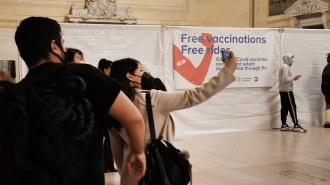 Health & Medicine
Health & MedicineHere’s what we know about the risks of serious side effects from COVID-19 vaccines
Allergic reactions, blood clots and possibly heart problems are rare and their risks don’t outweigh the benefits of getting vaccinated, experts say.
-
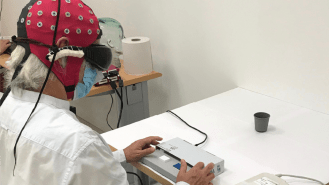 Genetics
GeneticsA gene-based therapy partially restored a blind man’s vision
Light-activated proteins inserted in eye nerve cells and special goggles help the man, who lost his sight due to retinitis pigmentosa, see objects.
-
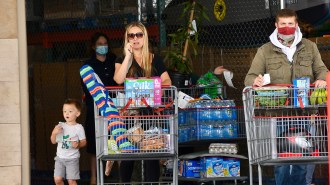 Health & Medicine
Health & MedicineThe CDC’s changes to mask guidelines raised questions. Here are 6 answers
Experts weigh in on the U.S. CDC’s recommendation fully vaccinated individuals removing masks indoors and what it means for the pandemic’s future.
-
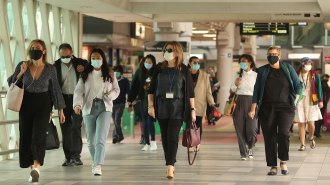 Health & Medicine
Health & MedicineCleaning indoor air may prevent COVID-19’s spread. But it’s harder than it looks
The size and setup of a room and how the room is used make finding simple ventilation and filtration solutions difficult.
-
 Health & Medicine
Health & MedicineAs the COVID-19 pandemic evolves, we answer 7 lingering vaccine questions
As U.S. vaccination efforts shift to get shots to the hard-to-reach, we take a look at some big questions about vaccines that still remain.
-
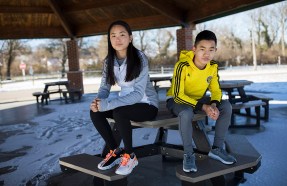 Health & Medicine
Health & MedicinePfizer’s COVID-19 vaccine recommended for adolescents by CDC committee
With the vaccine cleared for high schoolers and many middle schoolers, focus now turns to clinical trials testing COVID-19 vaccines in younger kids.
-
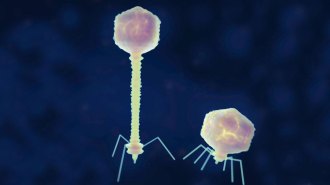 Life
LifeSome viruses thwart bacterial defenses with a unique genetic alphabet
DNA has four building blocks: A, C, T and G. But some bacteriophages swap A for Z, and scientists have figured out how and why they do it.
-
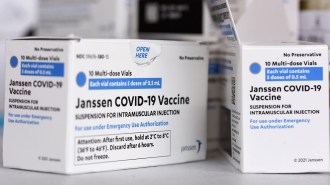 Health & Medicine
Health & MedicineFDA and CDC OK resuming J&J COVID-19 shots paused over rare clot concerns
The single-dose vaccine carries a low risk of rare blood clots in women under 50, but experts say its benefits outweigh that risk.
-
 Health & Medicine
Health & MedicineExperts predict U.S. COVID-19 cases will dip in summer but surge in winter
Masks, vaccines and coronavirus variants could all affect how bad a predicted winter surge gets.